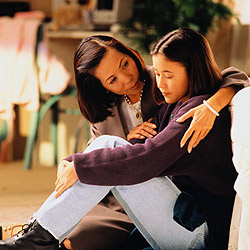Recently Zayn Malik, member of the stratospherically successful boy band One Direction, left the band in the middle of a world tour initially citing ‘stress’ as the reason for his departure. This very quickly changed to a permanent move in which Zayn said that ‘he just wanted to be a normal 22 year-old”.
Whatever the actual reasons behind his departure, and whatever Zayn’s future plans (we now know there may be a solo single in the pipeline), the news left teenage fans around the world bereft, traumatised and despairing. They took to social media to express their feelings which were, almost entirely, dramatic and passionate in their nature. Arguments raged, pain and angst were expressed and, later, media reports emerged of a worrying hashtag, #CutForZayn, where some young people were self-harming and posting pictures of the results online.
In response to this I tweeted that I felt it was important to support teenagers who were suffering. I was unfortunate enough to attract a Twitter troll who disagreed with me. He accused me of pandering to the media frenzy and that, by condoning teenage feelings of grief and distress, I was helping to create and perpetuate anxiety. His opinion was that I was creating a generation of ‘soft’ teenagers.
However, unpleasant and ignorant though this individual was, he was expressing something that many adults feel on some level: how can this be so important? Isn’t taking the crisis in One Direction seriously just encouraging teenagers to ‘act out’ or turning them into over-sensitive individuals? My answer is a firm “No”; in fact I think that ignoring or, worse, teasing about the very real grief and upset that something like Zayn’s departure can engender is rather cruel and, by doing it, we fail in our duty as adults to take care of our young people.
The One Direction news has moved on a little now and may not be in the headlines but I think it raises some important points about how we treat young people’s distress especially when we, as adults, don’t really see what all the fuss is about. Although we may find it hard to understand, the feelings that a fan of One Direction may have had are very real and very powerful. They may include grief, anger, fear, loss, loneliness and isolation.

There are several things I think it is important to think about when we deal with young people’s feelings around news like this, especially when we may have forgotten what it is like to be subject to the type of intense and powerful responses that teenagers experience.
All Emotions are OK
If we have an emotion, we have it. Someone else telling us our emotion is ‘wrong’ is not going to stop us from feeling it. It will simply make us feel isolated and misunderstood – a condition from which teenagers suffer anyway. If we don’t listen or we tease or belittle, we stop our teenagers from believing that their difficult feelings will be taken seriously. We push them away and they may well go elsewhere for what they need. The fact is there is no ‘right’ or ‘wrong’ way to react to something upsetting.
We all deserve to know that our feelings are valid
Whilst we are still growing up, we have not yet formed a full sense of our own identity. The teenage years are vital for developing our sense of self, exploring our likes and dislikes and finding our place in the world. If we are told that our feelings are ‘silly’ or that we shouldn’t be having them, especially by our primary caregivers and people who love us, our feelings are invalidated. We learn that we cannot trust our own emotions as we have been told they are not OK, or not right. As we grow up, we feel we cannot rely on our feelings to give us accurate information about our situation and position. We learn that others know more about how we feel than we do so we look to them to validate us. We do not learn to validate ourselves, to believe and understand that we are the people who best know us. As adults, we find ourselves in a constant state of tension as we deny our own emotions, looking to others to tell us what we can and can’t take seriously. In the extreme, this leads to situations where people can’t get out of dangerous and abusive situations because they don’t believe that their own feelings can be right. They look to their abuser to tell them how it really is.
The Teenage Brain is still developing – adult behaviour matters
We are only beginning to really understand the teenage brain. Research is ongoing and information is regularly coming to light that contradicts the received wisdom that the brain is fully formed by the age of five. New research indicates that there is a great deal of activity and brain development in the teenage years. This means that what happens to a teenager during this key time and how they are treated has a permanent effect on their way of relating to the world. Damage to self-esteem, empathy and understanding of others can still be done.
Learning to deal with grief and difficult feelings in a healthy way is an important life skill
Grief is something we all face in life, the death of loved ones, divorce, endings of friendships, loss of beloved pets, to name a few examples. Learning how to deal with grief in a healthy way is a very useful skill. Young people in a situation like this are dealing with a form of grief and loss. If we, as adults and carers, can support them through a difficult time, they learn skills which will help them next time they face an upsetting situation. Helping them to talk and listening sympathetically gives them the opportunity to release the feelings instead of bottling them up.

Having the ability to process and work through difficult feelings and emerge the other side will stand us in incredibly good stead in our future lives. We will have better relationships with others, better mental health, happier lives and more successful careers. Teenagers are still developing these kinds of skills and when they are faced with difficulties and loss, we have an opportunity to help them develop valuable coping skills.
What can we do to help?
As adults, parents, relatives, teachers, mentors and friends we can make ourselves available to listen. We can remember that teenagers feel things very intensely and that they may feel like their world has fallen apart even though we know it hasn’t. We can provide them with a safe place to express their grief. We can keep an eye on them to make sure difficult feelings don’t turn into something more sinister that might require the help of a doctor or counsellor and, if this is does become a concern, we can facilitate this for them without judgement. We can treat them with respect and as people, remembering that having our feelings validated teaches us that we can be trusted to know what is best for us and that we don’t have to look outside ourselves to feel valued.

We should be able to support our young people through their tough times –even if we don’t quite understand why that time is so tough; that isn’t our judgement to make!
Useful links for further information:
On validating and invalidating feelings:
On the teenage brain:
http://www.theguardian.com/lifeandstyle/2015/jan/25/secrets-of-the-teenage-brain



